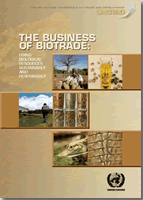
BioTrade refers to the collection, production, transformation, and commercialization of goods and services derived from native biodiversity (species and ecosystems) under the criteria of environmental, social and economic sustainability.
BioTrade Principles
To give fuller meaning to this concept, UNCTAD, together with international partners and practitioners at country level, has defined seven BioTrade principles. These principles provide an integrated framework for addressing the three objectives of the CBD within the broader context of sustainable development and responsible business. The BioTrade principles are:
-
Conservation of biodiversity
-
Sustainable use of biodiversity
-
Fair and equitable sharing of benefits derived from the use of biodiversity
-
Socio-economic sustainability (productive, financial and market management)
-
Compliance with national and international regulations
-
Respect for the rights of actors involved in BioTrade activities
-
Clarity about land tenure, use and access to natural resources and knowledge
This informational paper explores how the efforts of the BioTrade Initiative provide incentives for business to conserve biodiversity through using biological resources sustainably and responsibly. Through a review and assessment of distinct case studies, it identifies the actual, practical, bottom-up incentives generated by BioTrade partners and practitioners.
BioTrade case studies
The eight case studies presented here differ greatly, but each one demonstrates that BioTrade activities are generating a variety of practical, focused incentives to encourage the conservation of biodiversity and the sustainable use of biological resources.
-
Nativa and Cosmetic Valley (Colombia and France)
-
PhytoTrade Africa (southern Africa)
-
TreeCrops (Malawi)
-
Fondo Biocomercio (Colombia)
-
BioTrade and Caiman yacare (Plurinational State of Bolivia)
-
Jambi Kiwa (Ecuador)
-
The Union for Ethical BioTrade (International)
-
Funbio (Brazil)
These case studies validate how the UNCTAD Bio-Trade Initiative and its partners – in supporting trade as a positive incentive measure for biodiversity conservation – are addressing policy environment, supply capacity and market access issues with an intervention strategy that targets a variety of problems at different levels.




